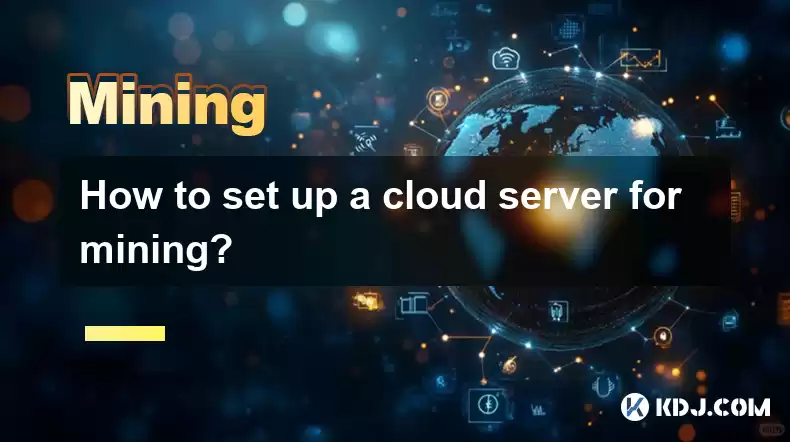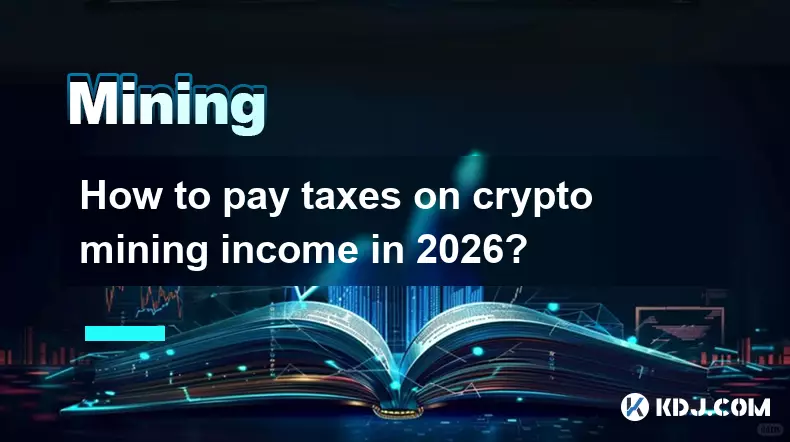-
 bitcoin
bitcoin $87959.907984 USD
1.34% -
 ethereum
ethereum $2920.497338 USD
3.04% -
 tether
tether $0.999775 USD
0.00% -
 xrp
xrp $2.237324 USD
8.12% -
 bnb
bnb $860.243768 USD
0.90% -
 solana
solana $138.089498 USD
5.43% -
 usd-coin
usd-coin $0.999807 USD
0.01% -
 tron
tron $0.272801 USD
-1.53% -
 dogecoin
dogecoin $0.150904 USD
2.96% -
 cardano
cardano $0.421635 USD
1.97% -
 hyperliquid
hyperliquid $32.152445 USD
2.23% -
 bitcoin-cash
bitcoin-cash $533.301069 USD
-1.94% -
 chainlink
chainlink $12.953417 USD
2.68% -
 unus-sed-leo
unus-sed-leo $9.535951 USD
0.73% -
 zcash
zcash $521.483386 USD
-2.87%
How to set up a cloud server for mining?
When choosing a cloud provider for crypto mining, consider pricing, location, server specs, and reliability. Factor in data transfer costs to ensure profitability.
Apr 01, 2025 at 02:49 am

Choosing the Right Cloud Provider and Server Specifications
Selecting a suitable cloud provider is crucial for successful cryptocurrency mining. Factors to consider include pricing, geographic location (considering electricity costs and network latency), available server specifications, and the provider's reputation for reliability. Major players like Amazon Web Services (AWS), Google Cloud Platform (GCP), and Microsoft Azure offer various server options, each with different capabilities and costs. Carefully evaluate your mining needs – the algorithm, hash rate requirements, and anticipated power consumption – before choosing a provider and server type. Remember to factor in the cost of data transfer, as this can significantly impact your profitability.
Understanding Server Requirements for Different Mining Algorithms
Different cryptocurrencies utilize different mining algorithms. The algorithm dictates the type of hardware best suited for mining. For example, Proof-of-Work (PoW) algorithms like SHA-256 (used by Bitcoin) require significant computing power, typically achieved with high-end GPUs or ASICs. Proof-of-Stake (PoS) algorithms, on the other hand, have less demanding hardware requirements. Before setting up your cloud server, research the specific hardware requirements of the cryptocurrency you intend to mine. This will help you choose the right server instance type with sufficient CPU, GPU, RAM, and storage.
Setting Up Your Cloud Server: A Step-by-Step Guide
The process involves several steps:
- Choose a Cloud Provider: Select a provider based on factors like cost, performance, and location.
- Select a Server Instance: Choose an instance type that meets your mining hardware requirements. Consider CPU, GPU, RAM, and storage needs.
- Create a Server Instance: Follow your chosen cloud provider's instructions to create a new virtual machine (VM) instance.
- Connect to Your Server: Use SSH or a similar method to securely connect to your newly created server.
- Install Operating System: Install a suitable operating system (OS) like Ubuntu Server, known for its stability and ease of use in server environments.
- Install Mining Software: Download and install the appropriate mining software for your chosen cryptocurrency. This software will connect to a mining pool.
- Configure Mining Software: Configure the mining software with your mining pool address and wallet address to receive your mining rewards. Ensure you have a strong password and regularly update your software for security.
- Monitor Your Server: Continuously monitor your server's performance, including temperature, hash rate, and uptime.
Security Considerations for Cloud Mining
Security is paramount when mining cryptocurrency on a cloud server. Cloud servers are vulnerable to various attacks, including hacking and denial-of-service (DoS) attacks. Always use strong passwords and enable two-factor authentication wherever possible. Regularly update your server's operating system and mining software to patch security vulnerabilities. Consider using a firewall to restrict access to your server and monitor network traffic for suspicious activity. Choose a reputable cloud provider with strong security measures.
Cost Optimization Strategies for Cloud Mining
Cloud mining can be expensive. To optimize costs, consider the following:
- Spot Instances: Use spot instances offered by cloud providers. These instances are cheaper than on-demand instances but can be terminated with short notice.
- Choose the Right Region: Select a region with lower electricity costs.
- Optimize Server Specifications: Choose the minimum specifications needed for your mining operation to reduce costs.
- Monitor Usage: Regularly monitor your server's resource usage to identify areas for optimization. Regularly review your cloud provider's pricing and explore different instance types to find the most cost-effective option.
Troubleshooting Common Issues in Cloud Mining Setup
Troubleshooting can be challenging. Common issues include:
- Connection Problems: Ensure your server is properly connected to the internet and your mining pool.
- Software Errors: Carefully check your mining software configuration and logs for errors.
- Hardware Limitations: Ensure your server's hardware meets the requirements of your chosen cryptocurrency.
- Security Breaches: Regularly check for suspicious activity and update your security measures. Consult the documentation of your chosen cloud provider and mining software for troubleshooting guidance.
Understanding the Profitability of Cloud Mining
Profitability depends on several factors, including the cryptocurrency's price, the difficulty of mining, the cost of electricity (or cloud server fees), and the hash rate of your mining hardware. Carefully calculate your projected mining revenue and compare it to your cloud server costs before starting. Fluctuations in cryptocurrency prices can significantly impact profitability.
Choosing the Right Mining Pool
Mining pools combine the hashing power of multiple miners, increasing the chances of finding a block and earning rewards. Choosing a reputable pool is crucial. Consider factors like pool fees, payout methods, and the pool's overall hash rate. Research different pools and compare their fees and performance before making a decision. A larger pool generally offers more frequent payouts.
Maintaining and Monitoring Your Cloud Mining Setup
Regular maintenance is essential for optimal performance and security. This includes:
- Regular Software Updates: Keep your operating system and mining software updated to patch security vulnerabilities and improve performance.
- Monitoring Hardware Temperatures: High temperatures can damage your hardware. Monitor temperatures and adjust cooling as needed.
- Monitoring Hash Rate: Track your hash rate to ensure your mining operation is performing efficiently. Regular monitoring helps you identify and address potential issues promptly.
Frequently Asked Questions
Q: Is cloud mining profitable?A: The profitability of cloud mining depends on many factors, including the cryptocurrency's price, mining difficulty, electricity costs (or cloud server costs), and the hash rate of your hardware. It's crucial to perform thorough calculations before starting.
Q: What are the risks associated with cloud mining?A: Risks include potential scams from unreliable cloud mining providers, security vulnerabilities on the cloud server, and fluctuations in cryptocurrency prices that could lead to losses.
Q: Which cloud provider is best for cloud mining?A: There's no single 'best' provider. The optimal choice depends on your specific needs (e.g., budget, geographic location, required hardware specifications). AWS, GCP, and Azure are popular options, each with its advantages and disadvantages.
Q: What is the difference between cloud mining and traditional mining?A: Traditional mining involves owning and managing your own mining hardware. Cloud mining involves renting computing power from a cloud provider, eliminating the need for upfront hardware investment.
Q: How do I choose the right mining software?A: The choice of mining software depends on the cryptocurrency you are mining. Research reputable mining software options for your chosen cryptocurrency and ensure it's compatible with your chosen hardware and operating system. Always download software from official sources.
Disclaimer:info@kdj.com
The information provided is not trading advice. kdj.com does not assume any responsibility for any investments made based on the information provided in this article. Cryptocurrencies are highly volatile and it is highly recommended that you invest with caution after thorough research!
If you believe that the content used on this website infringes your copyright, please contact us immediately (info@kdj.com) and we will delete it promptly.
- Bitcoin's Tightrope Walk: Navigating Opportunity Amidst Bull Trap Fears
- 2026-02-09 10:30:01
- Super Bowl 2026 Coin Toss: The Big Bet That Failed, Proving 'Heads' Reigns Supreme
- 2026-02-09 10:25:01
- DeepSnitch AI Ignites Crypto Presale Frenzy with Potential 100x Gains Amidst Market Volatility
- 2026-02-09 06:40:01
- Big Game Kickoff: BetMGM Deals $1,500 Bonus for Coin Toss Betting Thrills
- 2026-02-09 07:15:01
- Bitcoin's Rollercoaster: Navigating FOMO, Opportunity, and the Ever-Present Trap
- 2026-02-09 07:10:01
- The Super Bowl Coin Toss: A Flip of Fate, A Bet of Billions, and the Enduring Allure of Heads or Tails
- 2026-02-09 07:10:01
Related knowledge

How to mine crypto sustainably in 2026?
Feb 07,2026 at 04:20pm
Energy Source Optimization1. Miners increasingly deploy solar arrays directly on warehouse rooftops to power ASIC rigs during daylight hours. 2. Geoth...

How to increase the hash rate on a Bitcoin miner?
Feb 09,2026 at 08:19am
Optimizing Hardware Configuration1. Ensure all ASIC chips are fully powered and operating within their specified voltage range. Undervolting below the...

How to mine Conflux on a standard gaming laptop?
Feb 07,2026 at 04:19am
Hardware Requirements for Conflux Mining1. Conflux uses a proof-of-work consensus mechanism called Tree-Graph, which is designed to be ASIC-resistant ...

How to buy hashing power on cloud mining platforms?
Feb 08,2026 at 05:59pm
Understanding Cloud Mining Contracts1. Cloud mining platforms offer users the ability to rent hashing power without owning or maintaining physical har...

How to mine Flux with a 30-series Nvidia GPU?
Feb 07,2026 at 02:40pm
Market Volatility Patterns1. Bitcoin price movements often exhibit sharp intraday swings exceeding 5% during low-liquidity windows, particularly betwe...

How to pay taxes on crypto mining income in 2026?
Feb 07,2026 at 01:20am
Tax Classification of Mining Rewards1. Cryptocurrency received as mining rewards is treated as ordinary income by most major tax jurisdictions includi...

How to mine crypto sustainably in 2026?
Feb 07,2026 at 04:20pm
Energy Source Optimization1. Miners increasingly deploy solar arrays directly on warehouse rooftops to power ASIC rigs during daylight hours. 2. Geoth...

How to increase the hash rate on a Bitcoin miner?
Feb 09,2026 at 08:19am
Optimizing Hardware Configuration1. Ensure all ASIC chips are fully powered and operating within their specified voltage range. Undervolting below the...

How to mine Conflux on a standard gaming laptop?
Feb 07,2026 at 04:19am
Hardware Requirements for Conflux Mining1. Conflux uses a proof-of-work consensus mechanism called Tree-Graph, which is designed to be ASIC-resistant ...

How to buy hashing power on cloud mining platforms?
Feb 08,2026 at 05:59pm
Understanding Cloud Mining Contracts1. Cloud mining platforms offer users the ability to rent hashing power without owning or maintaining physical har...

How to mine Flux with a 30-series Nvidia GPU?
Feb 07,2026 at 02:40pm
Market Volatility Patterns1. Bitcoin price movements often exhibit sharp intraday swings exceeding 5% during low-liquidity windows, particularly betwe...

How to pay taxes on crypto mining income in 2026?
Feb 07,2026 at 01:20am
Tax Classification of Mining Rewards1. Cryptocurrency received as mining rewards is treated as ordinary income by most major tax jurisdictions includi...
See all articles





















![Is This a REAL Reversal or Fake out?? I wouldn't Get Excited Just Yet... [20 Min emergency stream] Is This a REAL Reversal or Fake out?? I wouldn't Get Excited Just Yet... [20 Min emergency stream]](/uploads/2026/02/08/cryptocurrencies-news/videos/origin_698897450a654_image_500_375.webp)


![Mesocosmos (By Biskotos) [All Coins] | Geometry Dash Mesocosmos (By Biskotos) [All Coins] | Geometry Dash](/uploads/2026/02/08/cryptocurrencies-news/videos/origin_69889be2eac64_image_500_375.webp)

















































